
It's the first Sunday for 1961 -- & StinkyLulu has a confession to make... You see, lovely reader, for the first time since "Supporting Actress Sundays" commenced in March, Lulu opted not to rescreen the entire film before composing a Sunday Supporting Actress profile. Why? Well, timing for one thing (the determination of 1961 only happened yesterday). But, truly, it's because 1961's Best Supporting Actress just happens to be Lulu's favorite performance in the single film that StinkyLulu's seen more times than any other.
And that performance is...
StinkyLulu's always shocked when pausing to contemplate Rita Moreno's nomination and win for her turn as Anita in West Side Story. First, StinkyLu's still amazed that Rita's nomination/win marked the end of the "golden era" of Latin actors being noticed by Oscar. See, in the fifteen years separating 1947 and 1961 (beginning with Thomas Gomez' largely forgotten Supporting Actor nomination for his performance in Ride the Pink Horse), Oscar had nominated Latin actors/actresses 10 times in 9 different years, sending three of those performers (Jose Ferrer, Anthony Quinn, Rita Moreno) home with four trophies (Quinn took home Supporting Actors in both 1952 and 1956). And among the six performers receiving these 10 nominations during 1947-61 (Ferrer & Quinn were each nominated 3 times in this period), only Katy Jurado '54 arrived to Hollywood as a professional emigré, leaving a successful career in the Mexican film industry to make movies in Hollywood. Six Latin actors (Gomez, Ferrer, Quinn, Jurado, Susan Kohner & Rita). Ten nominations. Four wins. All in the space of fifteen years.
In contrast, consider the 40+ years of Oscar since Anthony Quinn's last nomination (1964, Zorba) and leaving for now undiscussed the 1/4 century "dry spell" between 1964 and 1987: In the space of those 40+ years, ten nominations and one win (Benicio Del Toro, '00). (1947-61, counted 10 noms with 4 wins.) And of of the nine Latin actors nominated since Moreno's win in 1961 (Del Toro was also nominated in '03), three are professional emigrés (Javier Bardem '00; Salma Hayek '02; & Catalina Sandino Moreno '04) and two are iconic film stars in the national cinemas of their home countries (Argentina's Norma Aleandro '87 and Brazil's Fernanda Montenegro '98) whose work registers in the U.S. film industry infrequently, if at all. Only Quinn and Del Toro, along with Andy Garcia '90 and Rosie Perez '93, are what census takers would call "U.S. latinos"... Ten nominations. One win. In the space of forty-five years.
All of which makes 1947-61 look like a comparatively good period for Latin performers. And makes Rita Moreno's status as an iconic Oscar winner (who happens to be latina) all the more exceptional...
But the Latin scorecard on Oscar-night isn't the only shocking thing about Rita Moreno's Oscar for Anita in West Side Story... Almost more shocking is the fact that co-director Jerome Robbins didn't want Rita Moreno for the pivotal role of Anita, considering Moreno "a talentless movie star." As the story goes, the studio refused to consider Robbins' choice (Broadway's original Anita, Chita Rivera) and mandated the casting of Moreno, an established film presence. The famously petty Robbins is said to have used dance rehearsals to brutalize Moreno, relentlessly demanding that she "do it again" & announcing time and again that Moreno would never be nearly as good as Robbins' beloved Rivera. (Of course, once dance rehearsals were finished, the studio unceremoniously fired Jerome Robbins from the project and most principal photography proceeded apace.)
 Robbins' comparison of Chita to Rita has endured in countless wags' Chita-Rita-Anita gags. This is unfortunate because Rita's Anita is entirely different than Chita's -- and the most essential distinctions can be seen in the cinematic elaboration of the legendary "America" number. Remember that, in the stage version, "America" is a song sung among the Shark girls, with the naïve Rosalia being admonished for being nostalgic for her island home. On film, "America" draws its energy from an entirely different tension, becoming a battle of the sexes in which the Shark girls and Shark guys match each other's critique point by point. And it's in this dance-off -- a battle at once thrilling, erotic and silly -- that Rita Moreno's Anita emerges as something very distinct from what the stage allowed Anita. She's witty, she's smart, she's sexy, she's wise. And -- with Moreno -- it's all in her eyes. "America" is never not an extraordinary number but here -- even with the crazy sound mix blending Moreno's voice with that of the studio singer Betty Wand -- the screen version of "America" belongs to Moreno's Anita.
Robbins' comparison of Chita to Rita has endured in countless wags' Chita-Rita-Anita gags. This is unfortunate because Rita's Anita is entirely different than Chita's -- and the most essential distinctions can be seen in the cinematic elaboration of the legendary "America" number. Remember that, in the stage version, "America" is a song sung among the Shark girls, with the naïve Rosalia being admonished for being nostalgic for her island home. On film, "America" draws its energy from an entirely different tension, becoming a battle of the sexes in which the Shark girls and Shark guys match each other's critique point by point. And it's in this dance-off -- a battle at once thrilling, erotic and silly -- that Rita Moreno's Anita emerges as something very distinct from what the stage allowed Anita. She's witty, she's smart, she's sexy, she's wise. And -- with Moreno -- it's all in her eyes. "America" is never not an extraordinary number but here -- even with the crazy sound mix blending Moreno's voice with that of the studio singer Betty Wand -- the screen version of "America" belongs to Moreno's Anita.Indeed, the scenes between the musical numbers (in the dress shop, Maria's bedroom, the drugstore) show that Moreno can act even better than she dances. Like the early scene in the dress shop where Anita "gets it" that Tony and Maria are falling for each other. In sideways glances and shoulder shrugs, Moreno conveys her many worries about Maria's new romance while also showing herself to be a steadfast friend. Compare that -- much later -- to the unmitigated loathing she conveys in the flash of just one look, barging into Maria's bedroom to see if the man who'll "murder your love, he murdered mine" is still there. But nothing matches the range of emotions Moreno's Anita covers in her climactic visit to the drugstore.
Here, Anita goes to Doc's drugstore to get a message to Tony and is instead assaulted by the Jets, who barrage her with insults and innuendo. The original stage version of West Side Story left little question that the assault was a sexual one, possibly a rape. On screen, however, the nature of the assault is oblique, both abbreviated and stylized to emphasize the dramatic while avoiding the specific. (Indeed, the first time Little Lulu saw the film -- at about age 12 -- this pivotal encounter seemed little more than especially cruel rough-housing.) The moment in the drugstore -- when Anita chooses to lie about Maria's death (rather than convey mistaken information, as in the Shakespearean original) -- is essential in both narrative and thematic terms. And Moreno's performance -- her anguished fury and desperate fear -- delivers the moment's actual import to the screen.
All told, Rita Moreno's performance as Anita stands as one of the few Oscar wins to be both historic and deserving. (After all, she remains the first and only latina to win an Oscar.) Both nuanced and broad, subtle and bold, with kickass dancing to boot -- Moreno'll be a hard performance to top during this month of Supporting Actress Sundays. Nonetheless, StinkyLulu's still totally psyched by this month's roster just to see how close any of these extraordinary nominees comes...
(BTW: If you're at all inclined to continue this meditation on the "History of U.S. Latinos & OSCAR", be sure to look for 1947 nominee Thomas Gomez later this month as Rita Moreno's father in Summer and Smoke for which Una Merkel received a Supporting Actress 1961 nom.)

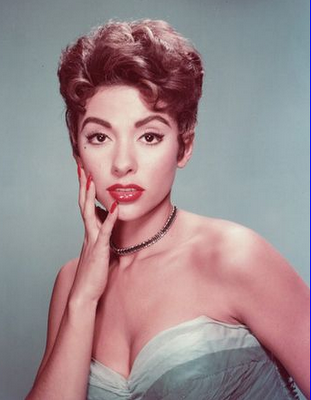



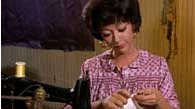
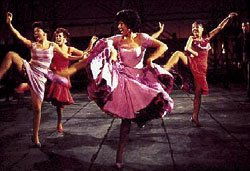

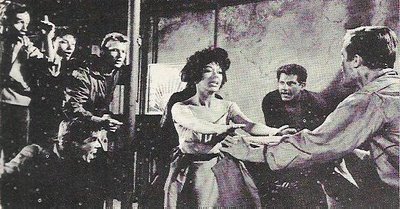
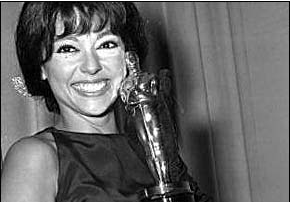
1 comment:
i love this performance so much and i haven't seen any of the others so I'm really excited to begin.
Post a Comment